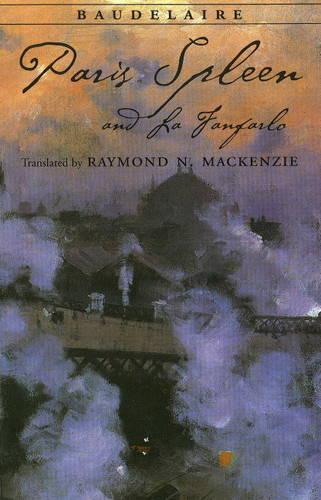
Paris Spleen, and La Fanfarlo
(Paperback)
Available Formats
Publishing Details
Paris Spleen, and La Fanfarlo
By (Author) Charles Baudelaire
Translated by Raymond N. MacKenzie
Hackett Publishing Co, Inc
Hackett Publishing Co, Inc
15th September 2008
United States
Classifications
General
Non Fiction
841.8
Physical Properties
Paperback
176
199g
Description
A diverse collection of fifty prose poems is provided in a clear, engaging, and accurate translation that conveys the lyricism and nuance of the original French text. Also included is a translation of Baudelaire's early novella, La Fanfarlo, which, alongside Paris Spleen, sheds light on the development of Baudelaire's work over time.
Reviews
Attractively produced and presented, this useful edition of Paris Spleen and La Fanfarlo reads as both serious and engaging. The introduction is clear without being condescending. It seems to me very much to the point--as is Baudelaire as always. --Mary Ann Caws, Distinguished Professor of English, French, and Comparative Literature, Graduate School, CUNY
A new translation is certainly welcome for providing fresh perspective on this provocative work, and the added bonus of Baudelaire's early novella, La Fanfarlo , makes this edition particularly useful and illuminating of the author's career as a whole. --Marc Caplan, Professor, Department of German and Romance Languages, The Johns Hopkins University
In this new translation Raymond MacKenzie has followed recent tradition in placing together Baudelaire's early novella and the collection of fifty prose poems which were published after his death. La Fanfarlo , published in 1847, is discussed in MacKenzie's clear and thought-provoking introduction under the heading "an experiment in narrative." As a narrative experiment Baudelaire's novella is one he judged to have failed, but MacKenzie's translation of the tale has a lightness of touch that captures the humour and pacing of this baroque fantasy and places it in the context of the poet's defiance of narrative expectations. The true experimental writing here is to be found in the prose poems of Paris Spleen . . . . if this translation is more prose than poetry, it allows a contemporary and fresh way of looking at the prose poems, and most importantly, to paraphrase Walter Benjamin, succeeds in not blocking the light of the original. -- Nineteenth-Century French Studies
Author Bio
Raymond N. MacKenzie is Professor of English, University of St. Thomas. His other works include a translation of Franois Mauriac's Thrse Desqueyroux (Rowman & Littlefield, 2005), Baudelaire's Paris Spleen and La Fanfarlo (Hackett, 2008), and Flaubert's Madame Bovary (Hackett, 2009).
